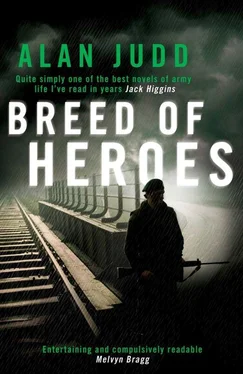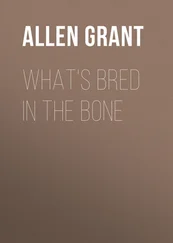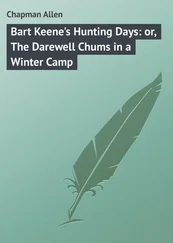Soon they were on the motorway, past the Milltown cemetery and out into the open country. This was rolling and lushly green but not very wooded. The farms were stone-built and looked bleak. Killagh before the bombings was a pleasant and not particularly interesting town, a mixture of eighteenth-century grey stone, nineteenth-century red brick and twentieth-century prefabricated blocks. There was a park and a rugby pitch. The barracks were on a hill, just beneath a new housing estate which sprawled almost to the summit. Built in the eighteenth century, they were enclosed by a high stone wall and had housed at various times redcoats, rebels and policemen. They now housed the Wessex Scouts. The entrance was through huge old wooden doors. It would have been homely and rather quaint as in any small English garrison town but for the coiled barbed wire along the top of the wall, a sandbagged position just inside the gates and an ominous-looking watch-tower in the centre.
Ever since leaving the ship the soldiers had been waiting for something to happen. Despite the uneventful journey and their arrival in an apparently peaceful country town, their hopeful aggression was still aroused and it needed a focus. The Wessex Scouts provided it. As Charles’s lorry rumbled through the cobbled entrance a sentry let go of one of the doors and it swung against the side of the lorry with a crash. There was no damage but the incident was sufficient.
‘Wessex are shit,’ someone shouted. This set the tone for the next twenty-four hours and became a catch-phrase for the next few weeks. The Ackies not unnaturally regarded themselves as an élite, and so were in constant need of an enemy. Anything wrong with the barracks, anything wrong with the town and any conceivable misfortune during the remaining twenty-four hours of the luckless Wessex’s tenure was laid at their door. Fortunately, there were only two platoons of Wessex left — too few to be regarded as a challenge, and so there were no NAAFI punch-ups. Disdain was not confined to the soldiers. At his first O Group the CO referred to ‘the appalling state in which these barracks have been left by the last unit, which I shall not name’. Only Anthony Hamilton-Smith had a good word for them. A fine old county regiment, he said, ruined by amalgamations forced upon them by grey civil servants and thoughtless governments. It was mixing good wine with bad, and the whole thing was very sad.
The barracks were very cramped. The quartermaster and his Q staff had arrived some days before in order to take over and allocate accommodation, and to cream off the best for themselves. Charles, after the usual confusion of wrong directions and missing kit, found himself sharing an underground cell with four others — Henry Sandy, Philip Lamb, the education officer, Tim Bryant and a newly-arrived subaltern from Sandhurst called Nicholas Chatsworth, known to everyone by his surname only. There was no furniture and no door, but eventually camp-beds appeared. The tunnel on which the cell opened led from the guardroom to A company’s accommodation, and so it was never quiet. It was the oldest part of the barracks, a warren of tunnels, passages, cells and dead-ends. Everywhere was damp, cold and crowded. Charles would have found it more interesting if he had not had to live in it. As it was, potential architectural and historical curiosities were mere inconveniences, things to be cursed and moaned about.
The Officers’ Mess was an incongruous 1930s-style house on a slight rise just inside the gates. The dining and living rooms formed the public rooms, while the bedrooms housed the CO, Anthony Hamilton-Smith and, in one, five company commanders. The quartermaster was rumoured to have another bungalow entirely to himself in another part of the barracks. He was a large, gruff, bristling man with a handlebar moustache and a sour dislike for mankind in general, subalterns in particular. No one had the temerity to tax him with the rumour, while the CO never heard rumours from below. No one aired them in his presence because if he did not like them he was inclined to treat the speaker as personally responsible for fabricating stories, while if he did like them he took them up as established fact and was all the more annoyed with the speaker if they proved to be untrue.
Charles went to the Mess for coffee. It was very crowded and he was about to go away when a platoon commander from the Wessex Scouts introduced himself. ‘I’m supposed to show you people round,’ he explained, ‘but no one seems to want to know. You wouldn’t fancy a trip round the battlements, I suppose?’
Charles did fancy it. His guide was in civilian clothes and looked happy. They made their way back to the old part of the barracks. ‘I’m glad to be getting out,’ the man said. ‘Four months is a long time to spend kicking your heels in a backwater like this. Pleasant enough place, though. You’re off to Belfast in three weeks, aren’t you? Don’t envy you that. Bound to be bloody. Mucker of mine from Sandhurst was killed there, less than twenty-four hours after arriving. But this place is all right. Not a bad social life. Plenty of birds to keep the soldiers happy. One or two for the officers too, if you’ve got a car.’
‘Car?’
‘Yes. Didn’t you bring one?’
‘No.’
‘None of you?’
‘No.’
‘Oh dear. You can’t have much fun without one, I’m afraid. We all brought ours. Still, it is only four months.’ They climbed a winding stone staircase that led to the battlements, from where they had a good view of the town and the surrounding countryside. ‘Not bad, is it? In fact, it’s a damn fine view on a clear day. We used to come up here sunbathing when the weather was warm. Don’t imagine you’ll do much of that, though. That estate up the hill is where all the girls come from. They hang around the gates day and night, just asking for it. The lads see they get it too. That rugby pitch is the local club. We played them a couple of times. Good crowd. Fantastic drinkers. Some of our lads played for them too.’
They walked along the battlements and up into the watch-tower. It contained one bored soldier who was fiddling aimlessly with the rear sight on his rifle when they arrived. ‘Nothing doing?’ the Wessex officer asked the soldier.
‘Sweet Fanny Adams, sir,’ the soldier said.
The Wessex officer turned to Charles. ‘There never is, you see. We have to man this day and night which is a bloody nuisance because there’s no point. Unless you’re expecting an airborne landing or something.’
‘Have you had much trouble?’
‘None at all.’
There was some shouting below them which sounded refreshingly distant. It seemed that a morning walk along the battlements might be no bad thing during the coming weeks.
‘Even if there were any trouble,’ continued the Wessex officer, ‘you wouldn’t see much from up here. You’d need to be on the ground.’
The shouting became louder. A small group of figures, which included the CO and the RSM, was looking up at them. The CO was shouting something with his hands cupped round his mouth and several people started running towards the entrance to the battlements. Charles looked up to see if there was imminent disaster overhead but the sky was clear.
‘What do they want?’ asked the Wessex officer.
‘No idea.’
‘It is something to do with us, I suppose?’
‘Looks like it.’
The RSM was bawling as well. Charles distinguished a familiar phrase. ‘They’re shouting “hard targets”,’ he said.
‘What do they mean?’
‘They mean we should either get under cover or somehow make it difficult for the person who’s about to shoot at us to do so without being shot.’
‘No one’s about to shoot at us, are they?’
Читать дальше












